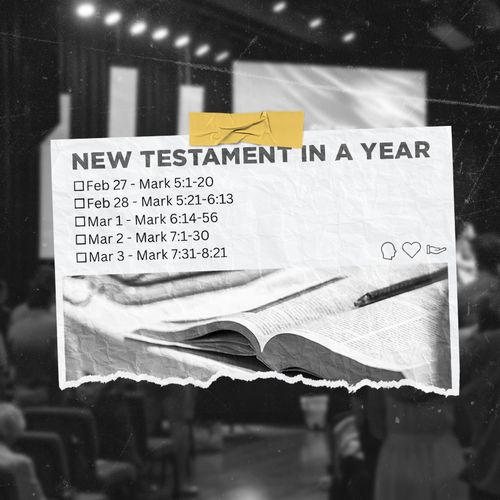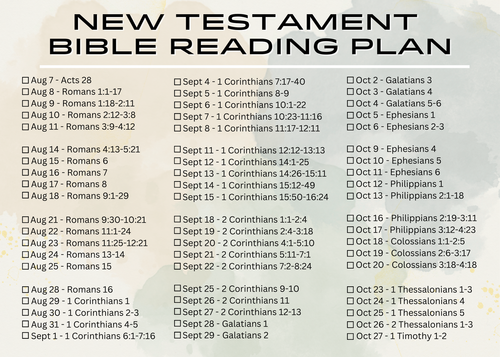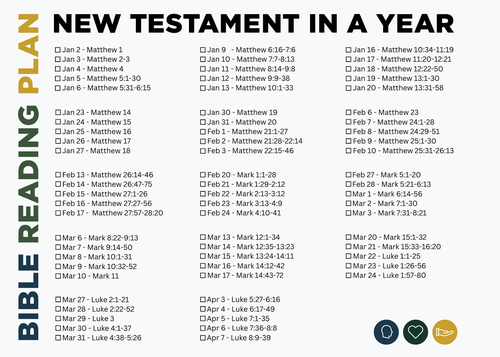Power Had Gone Out

Jesus Heals a Woman and Jairus’s Daughter
21 And when Jesus had crossed again in the boat to the other side, a great crowd gathered about him, and he was beside the sea. 22 Then came one of the rulers of the synagogue, Jairus by name, and seeing him, he fell at his feet 23 and implored him earnestly, saying, “My little daughter is at the point of death. Come and lay your hands on her, so that she may be made well and live.” 24 And he went with him. And a great crowd followed him and thronged about him. 25 And there was a woman who had had a discharge of blood for twelve years, 26 and who had suffered much under many physicians, and had spent all that she had, and was no better but rather grew worse. 27 She had heard the reports about Jesus and came up behind him in the crowd and touched his garment. 28 For she said, “If I touch even his garments, I will be made well.” 29 And immediately the flow of blood dried up, and she felt in her body that she was healed of her disease. 30 And Jesus, perceiving in himself that power had gone out from him, immediately turned about in the crowd and said, “Who touched my garments?” 31 And his disciples said to him, “You see the crowd pressing around you, and yet you say, ‘Who touched me?’ ” 32 And he looked around to see who had done it. 33 But the woman, knowing what had happened to her, came in fear and trembling and fell down before him and told him the whole truth. 34 And he said to her, “Daughter, your faith has made you well; go in peace, and be healed of your disease.”
35 While he was still speaking, there came from the ruler’s house some who said, “Your daughter is dead. Why trouble the Teacher any further?” 36 But overhearing what they said, Jesus said to the ruler of the synagogue, “Do not fear, only believe.” 37 And he allowed no one to follow him except Peter and James and John the brother of James. 38 They came to the house of the ruler of the synagogue, and Jesus saw a commotion, people weeping and wailing loudly. 39 And when he had entered, he said to them, “Why are you making a commotion and weeping? The child is not dead but sleeping.” 40 And they laughed at him. But he put them all outside and took the child’s father and mother and those who were with him and went in where the child was. 41 Taking her by the hand he said to her, “Talitha cumi,” which means, “Little girl, I say to you, arise.” 42 And immediately the girl got up and began walking (for she was twelve years of age), and they were immediately overcome with amazement. 43 And he strictly charged them that no one should know this, and told them to give her something to eat.
Jesus Rejected at Nazareth
6 He went away from there and came to his hometown, and his disciples followed him. 2 And on the Sabbath he began to teach in the synagogue, and many who heard him were astonished, saying, “Where did this man get these things? What is the wisdom given to him? How are such mighty works done by his hands? 3 Is not this the carpenter, the son of Mary and brother of James and Joses and Judas and Simon? And are not his sisters here with us?” And they took offense at him. 4 And Jesus said to them, “A prophet is not without honor, except in his hometown and among his relatives and in his own household.” 5 And he could do no mighty work there, except that he laid his hands on a few sick people and healed them. 6 And he marveled because of their unbelief. And he went about among the villages teaching.
Jesus Sends Out the Twelve Apostles
7 And he called the twelve and began to send them out two by two, and gave them authority over the unclean spirits. 8 He charged them to take nothing for their journey except a staff—no bread, no bag, no money in their belts— 9 but to wear sandals and not put on two tunics. 10 And he said to them, “Whenever you enter a house, stay there until you depart from there. 11 And if any place will not receive you and they will not listen to you, when you leave, shake off the dust that is on your feet as a testimony against them.” 12 So they went out and proclaimed that people should repent. 13 And they cast out many demons and anointed with oil many who were sick and healed them.
21 And when Jesus had crossed again in the boat to the other side, a great crowd gathered about him, and he was beside the sea. 22 Then came one of the rulers of the synagogue, Jairus by name, and seeing him, he fell at his feet 23 and implored him earnestly, saying, “My little daughter is at the point of death. Come and lay your hands on her, so that she may be made well and live.” 24 And he went with him. And a great crowd followed him and thronged about him. 25 And there was a woman who had had a discharge of blood for twelve years, 26 and who had suffered much under many physicians, and had spent all that she had, and was no better but rather grew worse. 27 She had heard the reports about Jesus and came up behind him in the crowd and touched his garment. 28 For she said, “If I touch even his garments, I will be made well.” 29 And immediately the flow of blood dried up, and she felt in her body that she was healed of her disease. 30 And Jesus, perceiving in himself that power had gone out from him, immediately turned about in the crowd and said, “Who touched my garments?” 31 And his disciples said to him, “You see the crowd pressing around you, and yet you say, ‘Who touched me?’ ” 32 And he looked around to see who had done it. 33 But the woman, knowing what had happened to her, came in fear and trembling and fell down before him and told him the whole truth. 34 And he said to her, “Daughter, your faith has made you well; go in peace, and be healed of your disease.”
35 While he was still speaking, there came from the ruler’s house some who said, “Your daughter is dead. Why trouble the Teacher any further?” 36 But overhearing what they said, Jesus said to the ruler of the synagogue, “Do not fear, only believe.” 37 And he allowed no one to follow him except Peter and James and John the brother of James. 38 They came to the house of the ruler of the synagogue, and Jesus saw a commotion, people weeping and wailing loudly. 39 And when he had entered, he said to them, “Why are you making a commotion and weeping? The child is not dead but sleeping.” 40 And they laughed at him. But he put them all outside and took the child’s father and mother and those who were with him and went in where the child was. 41 Taking her by the hand he said to her, “Talitha cumi,” which means, “Little girl, I say to you, arise.” 42 And immediately the girl got up and began walking (for she was twelve years of age), and they were immediately overcome with amazement. 43 And he strictly charged them that no one should know this, and told them to give her something to eat.
Jesus Rejected at Nazareth
6 He went away from there and came to his hometown, and his disciples followed him. 2 And on the Sabbath he began to teach in the synagogue, and many who heard him were astonished, saying, “Where did this man get these things? What is the wisdom given to him? How are such mighty works done by his hands? 3 Is not this the carpenter, the son of Mary and brother of James and Joses and Judas and Simon? And are not his sisters here with us?” And they took offense at him. 4 And Jesus said to them, “A prophet is not without honor, except in his hometown and among his relatives and in his own household.” 5 And he could do no mighty work there, except that he laid his hands on a few sick people and healed them. 6 And he marveled because of their unbelief. And he went about among the villages teaching.
Jesus Sends Out the Twelve Apostles
7 And he called the twelve and began to send them out two by two, and gave them authority over the unclean spirits. 8 He charged them to take nothing for their journey except a staff—no bread, no bag, no money in their belts— 9 but to wear sandals and not put on two tunics. 10 And he said to them, “Whenever you enter a house, stay there until you depart from there. 11 And if any place will not receive you and they will not listen to you, when you leave, shake off the dust that is on your feet as a testimony against them.” 12 So they went out and proclaimed that people should repent. 13 And they cast out many demons and anointed with oil many who were sick and healed them.
Urgent Needs And Power
Jesus's authority and power extended far beyond what the people could possibly understand. Jesus is the Lord of life. He had come to defeat the last enemy... death. In typical Mark fashion, the account is sandwiched around another miraculous healing of a woman suffering from years-long hemorrhaging. Not even death can stop the King and his kingdom.
As Jesus returned to the western side of Galilee, he was met by Jairus, who was desperate—his daughter was at death's door. Jairus was meek and trusting, willing to accept his helplessness. He knew that his daughter's life hung in the balance, yet he believed that Jesus could heal her with just a touch of His hand.
As Jesus returned to the western side of Galilee, he was met by Jairus, who was desperate—his daughter was at death's door. Jairus was meek and trusting, willing to accept his helplessness. He knew that his daughter's life hung in the balance, yet he believed that Jesus could heal her with just a touch of His hand.
Interrupted
The story of the woman with the issue of blood interjects the Jairus narrative, highlighting Jesus' boundless commitment to reaching out to all who approach him in faith. Mark recounts that this woman had been struggling with her illness for twelve years, and all medical solutions had failed. Luke, the doctor, gave a gentler description of the situation (Lk 8:43). Despite being rejected by society, she believed that just a touch of Jesus' garment could heal her. Instead of Jesus being "defiled," he made her "clean." Jesus perceived power had left him and wanted to know who had touched him. Confounded, the disciples let Jesus know they thought his query was ludicrous (31). The trembling woman recognized that her contact with him had ceremonially desecrated him and perhaps sullied every person in attendance. They could have been denied participation in any religious activities per Jewish custom. Terrified and trembling, she fell before Jesus and explained her situation. It is essential to notice that Jesus did not say, "My garments or your touch has saved you," but "Your faith has healed you."
Only Believe
Upon hearing the sobering news that his daughter had passed away, Jairus faced a dilemma: can he believe in the impossible even if all worldly wisdom suggested otherwise? Jesus asked him to do this when he arrived at the house and found it filled with hired mourners. His earlier conversation with an ill woman delayed his arrival, making Jairus's unlikely faith journey much more challenging (35). Their mocking laughter demonstrated a lack of faith, believing it was foolish to think she was unconscious. They were all too familiar with death for this to be plausible. Jesus's remark about her sleeping was a new lens to see death through. The mourners' lack of faith caused them to miss out on this miracle.
Nonetheless, Peter, James, and John (the so-called 'inner three') were at the scene with the parents. Moreover, when He spoke in His native language—Aramaic. He used a phrase filled with love translated by Mark as "little girl" but carries the same endearing meaning as calling someone a 'little lamb' in English. After restoring life to the child and watching her move around, Jesus instructed her parents to provide food for her. This simple yet significant gesture guided the awe-struck family to a more normal routine.
Nonetheless, Peter, James, and John (the so-called 'inner three') were at the scene with the parents. Moreover, when He spoke in His native language—Aramaic. He used a phrase filled with love translated by Mark as "little girl" but carries the same endearing meaning as calling someone a 'little lamb' in English. After restoring life to the child and watching her move around, Jesus instructed her parents to provide food for her. This simple yet significant gesture guided the awe-struck family to a more normal routine.
Keep Believing
The story of Jairus is a testament to Jesus' power over death and the difficulties that life throws at us. Despite the obstacles - from the clamor of people pressing in around him (5:24) to an unexpected interruption (5:25) culminating with his daughter's death before he could even reach home (5:35), Jesus offered a message of hope and courage, urging Jairus not to despair but only believe instead (5:36). Thus demonstrating His miraculous abilities beyond all doubt. Throughout this passage, the importance of faith is heavily underscored—you cannot hope to gain blessings from God unless you trust in Him (5:34; 6:6; Heb 11:6).
Rejected
These powers of the kingdom seem to have had minimal effect on some of those who saw them or heard of them based on what happens next. Jesus' ministry reaches more and more people with his incredible miracles, yet the parable of the soils is still relevant; God's kingdom advances by spreading His word and allowing individuals to make their own choice. Sadly, in this instance, those from Jesus' hometown of Nazareth reject him due to their sinful response—a particularly painful rejection since it came so close to home. As recorded in John 1:11, Jesus came to His own people, yet they denied Him. This passage emphasizes the significance of faith because despite being all-powerful, God did very little because of their lack of belief (Heb 11:6). The absence of miracles is not a reflection of God's power but rather an indication that without faith, you cannot please God.
Twos
Jesus sends out the twelve to carry on his work, authorizing them (6:7), providing instructions concerning their resources (6:8–9), and suggesting responses they may encounter while preaching (6:10–11). We are then given a brief summary of their accomplishments in spreading Jesus' message, which differ greatly from the ill-response he received back home in Nazareth. Momentous tales of healing and salvations accompany this triumphant chapter as is made evident by verses 6:12 -13.





Recent
Archive
2023
January
Happy New Year!He Will Save His People From Their SinsMy Beloved SonTemptation And MinistryThe SermonLeaving, Lying, Limits, Love, Largesse, and The Lord's PrayerTreasure, Anxiety, and JudgmentAstonishing AuthorityStorms, Demons, and HealingJesus Is CompassionateHis Eye Is On The SparrowSwords, Rewards, and MessengersThe Lord of the SabbathBlasphemy, Bad Trees, Signs, and FamilyStories, Sowers, and SoilsParables, Hidden Treasure, and RejectionFame, Food, Fear, Faith, and FringeReal Issues And The Power Of GodDying To Find LifeLike The SunChildren, Temptation, Sheep, And ForgivenessMarriage, Kids, And MoneyTo Serve And Give His Life
February
The ArrivalStories That StingQuestion TrapsHidden Motives And LamentThe End...?UnexpectedReady?Punishment, The Plot, And PerfumeTreachery, Passover, and The CupBetrayal, Injustice, And DenialThe Field Of Blood And The GovernorCrucifixion And DeathAll AuthorityMark—The Beginning Of The GospelHealing, Preaching, And The Forgiveness Of SinEating With Tax Collectors, Fasting, The Sabbath, And An Escape BoatThe Twelve, Blasphemy, Family, And A ParableParables And PowerA Different Kind Of StormPower Had Gone Out
March
Death, Hunger, And MiraclesCommandment Or TraditionDo You Not Yet Understand?The Christ And A Glimpse Of His GloryUnbelief, Confusion, And SinDivorce, Children, And PossessionsTo Give His Life As A RansomHosannaThe Rejected Stone, Taxes, And The Great CommandmentDestruction And The EndNo One Knows, An Anointing, And A Promise To BetrayPassover And GethsemaneThe Kiss, Arrest, And DenialPilate, Simon, And The CrucifixionDeath, Burial, Resurrection, And What\'s NextTheophilus And A Visit From GabrielMary And The MagnificatBenedictusThe Arrival And The ShepherdsSimeon, Anna, And The SpiritFruits Keeping With Repentance And BaptismThe Wilderness, Nazareth, And CapernaumSimon's Mother-In-Law, Fishing, A Leper, And Sins
April
Tax Collectors, Fasting, Sabbath Controversies, And The TwelveWhy Do You Call Me Lord, Lord?Jesus Marveled, A Raised Son, And QuestionsA Sinful Woman And A ParableObeying The Word, A Storm, And DemonsTwelve Years, Twelve Apostles, And SpeculationGreater, Costly, And GloryNot Getting It, The Cost, And AppointedWoes, Neighbors, And What Is NecessaryHelp Us Pray And A Divided Kingdom?Signs, Lights, And WoesHypocrisy, Fear, A Fool, And AnxietyParables, Division, And The TimesWarnings, A Daughter Of Abraham, And Jerusalem, JerusalemA Son Or An Ox, Parties, And DiscipleshipLost ThingsThe Dishonest Manager, The Law, And Anguish In This FlameMillstones And Mustard SeedsPersistent Prayer, Humility, A Childlike Faith, And The Rich RulerEverything That Is Written, A Blind Beggar, And A Wee Little Man
May
A Parable, A Colt, A Prophecy, And A CleansingAuthority, Wicked Tenants, And TaxesThings To Beware Of And WidowsDestruction, Persecution, The Son Of Man, And WatchingThe Plot, Betrayal, Lord's Supper, And Inappropriate BehaviorPrediction, Fulfillment, Agony, Betrayal, And DenialMistreated, Taken Before The Council, Pilate, Herod, And Delivered To Be CrucifiedCrucifixion, Death, And BurialHe Is Not HereDisbelieved For JoyIn The Beginning…The Lamb Of God And A WeddingZeal, What's Inside, And Born AgainHe Must Increase
Categories
no categories
Tags
no tags
